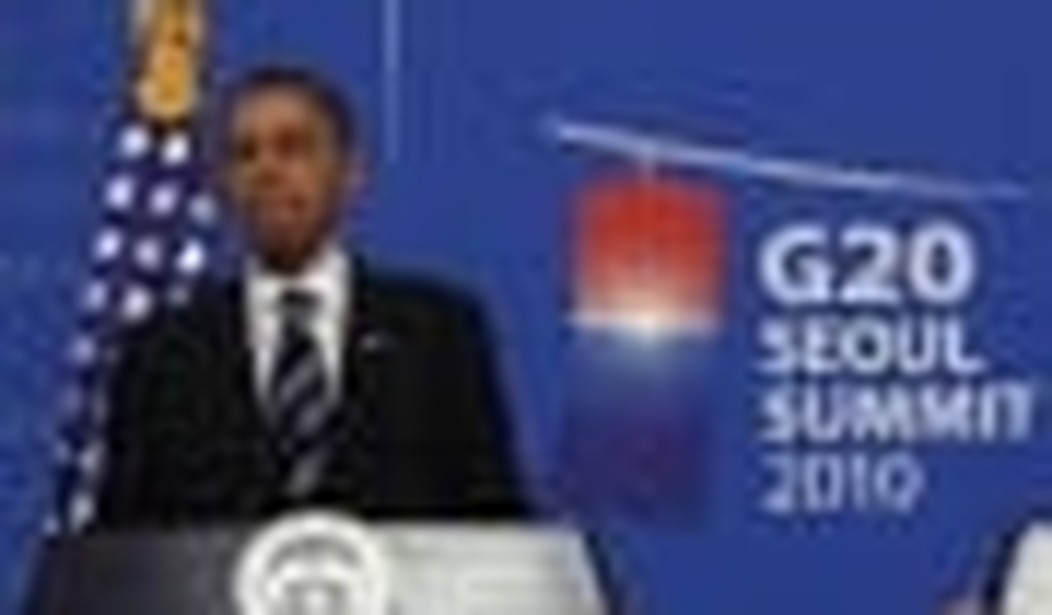President’s Obama’s march through Asia was beginning to resemble a triumphal tour. In both India and Indonesia — the first two stops on the 10-day, four-nation visit that ended Sunday — he dazzled his hosts and thrived on the adulation. On most scorecards — including mine — he received top marks in each country. Bravo, Mr. President.
Then Mr. Obama arrived in Seoul. There, he earned an “F,” failing two critical tasks. In both cases, the wounds were self-inflicted. And grievous.
First, the president failed to clinch a deal with the South Koreans over the pending free-trade deal, known as “KORUS.” The agreement was signed in June 2007, but the Bush administration did not submit it for congressional ratification due to issues raised by domestic constituencies — primarily cattle ranchers and automakers.
President Obama, this June, said that Washington and Seoul would settle the outstanding issues by the time of the G-20 meeting, which took place last Thursday and Friday. A week ago, there was no hint of trouble as both the White House and the Blue House saw the agreement as vital to their economies. The deal, according to the U.S. International Trade Commission, would increase U.S. exports by $10 billion, for instance. More important, KORUS has always been viewed as strategically crucial, shoring up an alliance being tested by both North Korea and its ally, China.
On Wednesday, Beltway insiders were reporting that Washington and Seoul had “hammered out a basic compromise,” to quote the influential Nelson Report. Observers, therefore, were stunned the following day when they learned that the two governments could not agree on last-minute items. There are conflicting narratives as to the cause of the failure — Obama’s highhanded tactics with his South Korean counterpart regarding beef figures prominently in analyses — but there is one point that is indisputable: the president has just created a rift with a nation of increasing importance to the United States.
What happened? “Somebody didn’t do the advance work,” said Fox News analyst KT McFarland to Neil Cavuto on his Fox Business show on Friday. “Every president I’ve worked for you know what you’re going to get from the end of one of these summits. You don’t walk into it hoping for the best. You walk into it knowing.”
Even if Obama reaches a KORUS deal soon — a possibility raised by his dwindling number of defenders — the president walked out of the negotiations with South Korea damaged, and that led to an even worse disaster. The world was supposed to come together at the Seoul G-20 to unwind global imbalances. The term “imbalances” has become code for China’s persistent trade surpluses, which are largely the result of Beijing’s fixing the value of the renminbi at a low level to stimulate exports and impede imports.
China, however, largely escaped criticism at the G-20. In fact, the United States, a victim of the China-induced global downturn, ended up at the meeting being labeled the world’s chief currency villain.
How in the world did that happen?
In the week before the summit in South Korea, the Federal Reserve unveiled its “quantitative easing” plan, more commonly known as “QE2.” QE2 involves the Fed stimulating the U.S. economy by increasing the money supply. It is doing that by buying $600 billion of U.S. government debt.
It doesn’t take a Nostradamus to figure out that another $600 billion in circulation will decrease the value of the greenback in global markets. So it wasn’t hard for the Chinese in Seoul to tar the Obama administration, deflecting attention from their predatory currency policies. Forget that there would be no need for QE2 if the Chinese had not rigged the value of the renminbi in the first place. The U.S. got blamed in Seoul — and China largely did not. Obama handed the Chinese a weapon, and they turned around and drove it right through him.
President Obama tried to deflect criticism by saying that the Fed acts independently of the White House. That’s the theory, but the reality is that one phone call — “Mr. Bernanke, please hold off QE2 for a little while so that I can defend the world’s system of international commerce from Beijing’s predatory trade policies” — would have avoided the second debacle in Seoul.
And what a debacle it is. Now, the global currency war that had started in the months before the G-20 will surely injure all economies. In recent weeks, 18 nations — 19 if you include the U.S. — were depressing the values of their currencies. If you’re looking for a historical parallel, think about the tariff war of the 1930s that deepened the Great Depression.
And we all know what happened after that.









Join the conversation as a VIP Member